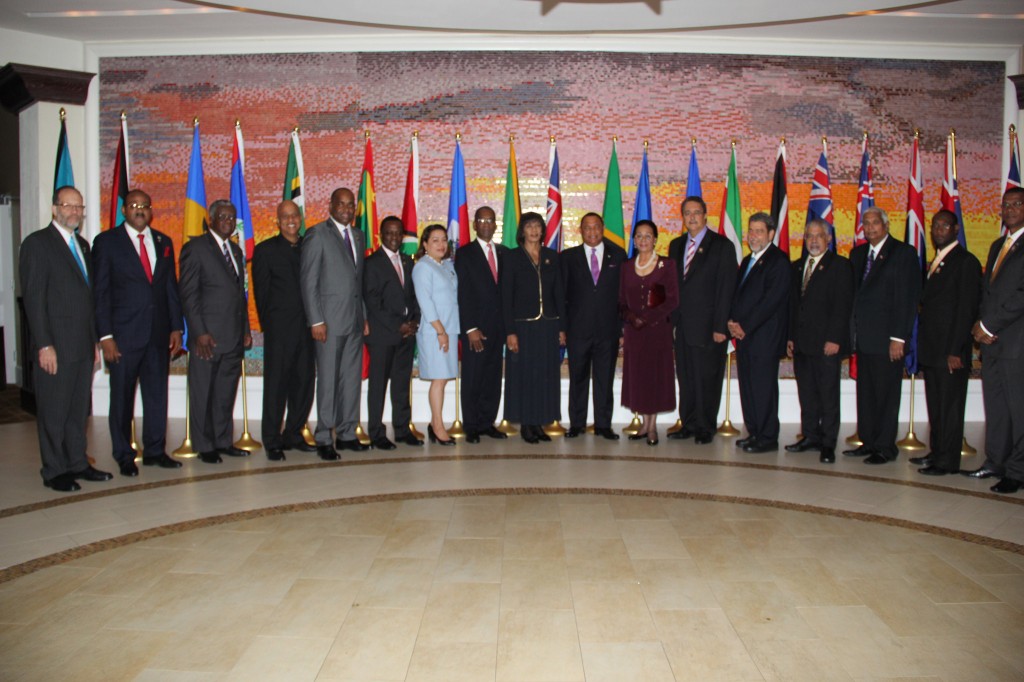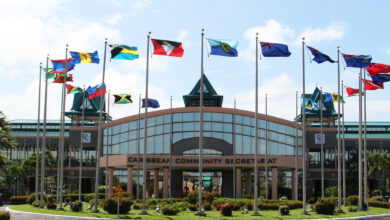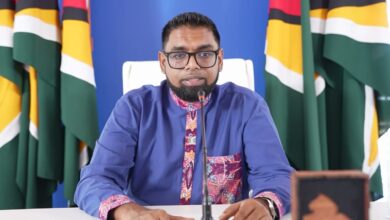(CARICOM Secretariat, Turkeyen, Greater Georgetown, Guyana) The Twenty-Sixth Inter-Sessional Meeting of the Conference of Heads of Government of the Caribbean Community (CARICOM) was held in Nassau, The Bahamas, 0n 26-27 February 2015. The Prime Minister of The Bahamas, the Right Honourable Perry Christie, chaired the proceedings.
Other members of the Conference in attendance were: the Prime Minister of Antigua and Barbuda, Honourable Gaston Browne; the Prime Minister of Barbados, Rt. Honourable Freundel Stuart; the Prime Minister of Belize, Honourable Dean Barrow; the Prime Minister of the Commonwealth of Dominica, Honourable Roosevelt Skerrit; the Prime Minister of Grenada, Dr. the Rt. Honourable Keith Mitchell; the Prime Minister of Jamaica, the Most Honourable Portia Simpson-Miller; the Prime Minister of Saint Lucia, Dr. the Honourable Kenny D. Anthony; the Prime Minister of St. Vincent and the Grenadines, Dr. the Honourable Ralph Gonsalves; and the Prime Minister of Trinidad and Tobago, Honourable Kamla Persad-Bissessar.
Suriname was represented by the Vice President, His Excellency Robert Ameerali. Guyana was represented by Honourable Carolyn Rodrigues-Birkett, Minister of Foreign Affairs; Haiti was represented by His Excellency Antonio Rodrigues, Ambassador to The Bahamas.
Associate Members in attendance were: the Honourable Dr. Rufus Ewing, Premier of Turks and Caicos Islands; and the Honourable Jerome Roberts, acting Chief Minister of Anguilla.
Opening Statements
The Chairman of Conference, Rt. Honourable Perry Christie, Prime Minister of The Bahamas, the immediate past chair, Honourable Gaston Browne, Prime Minister of Antigua and Barbuda, and Ambassador Irwin LaRocque, Secretary-General of the Caribbean Community, made statements at the opening.
The Chairman issued a stirring call on behalf of the Region’s youth and asked his colleague Heads of Government to ensure that “tomorrow’s leaders are academically, socially and mentally ready.”
Prime Minister Christie indicated that he would urge the meeting to make a regional commitment to greater investment in and attention to Education, Culture and Sport. It was on his initiative that the principal topic of the meeting, “Leveraging CARICOM’s Human, Cultural and Natural Resources for the Economic Development of the Community”, was placed on the agenda.
The immediate past Chairman spoke on the theme of the challenges faced by small states due to the actions of bigger nations. Prime Minister Browne alluded to the decision by the European Union in respect of beet sugar which would adversely affect Caribbean sugar producers. He also cited the financial services sector as another area of unjust action which threatened, in particular, the indigenous banks of the Region.
Secretary-General LaRocque posited that for the Region to emerge from the period of low growth required new critical thinking about integration. He stated that “the creativity for which we are renowned must now be allied to an entrepreneurial spirit, innovation and productivity.” That, he said, was “a sure way of achieving the competitiveness so necessary to fuel economic growth.”
Signings
Dr. the Hon. Kenny D. Anthony, Prime Minister of Saint Lucia, signed the Agreement Establishing the Caribbean Accreditation Agency for Medicine and Health Professions (CAAM-HP). CAAM-HP is the body established in 2003 to determine and prescribe standards and to accredit education programmes of medical, dental, veterinary and other health professions on behalf of the contracting parties in CARICOM.
Leveraging CARICOM’s Human, Cultural and Natural Assets for the Economic Development of the Community
Heads of Government, in seeking new development pathways in the pursuit of inclusive, equitable and sustainable growth, acknowledged the potential of the cultural and creative industries in contributing to the development of the Region. They reaffirmed the significance of the cultural and creative industries to CARICOM integration and the CSME, and as a driver of social development and cohesion, cultural identity and diversity, and youth engagement.
The presentation highlighted the fact, that according to the CARICOM Commission on Youth Development (the CCYD), youth are the backbone of the creative industries in CARICOM, both as consumers and producers and that youth under 30 years constituted as much as sixty percent of the region’s population. A strategy that combined the cultural and sporting assets with the Region’s innovative youthful human resource and with new technologies, opened up opportunities for a new and sustainable development pathway that leverages the Community’s strengths.
Heads of Government accepted the need for further developing the enabling environment for the cultural and creative industries in the Region to grow. They also agreed on the critical importance of strengthening the regional capacity to implement the Regional Development Strategy for the Cultural Industries in CARICOM.
In that regard, they endorsed the idea of the CARICOM Secretariat and Caribbean Export Development Agency (Caribbean Export) preparing a proposal for a Caribbean Creative Industries Management Unit. The Unit would be located in Caribbean Export in Barbados and would be self-sustaining and self-financing and report to the Regular Meeting of Heads of Government in July 2015.
Heads of Government directed the CARICOM Secretariat and the CARICOM Development Fund (CDF) to collaborate with CARIFORUM, Caribbean Export and the Caribbean Development Bank (CDB) to identify donor resources for the financing of the development of the cultural and creative industries. The CDF and the CDB were asked to collaborate, in consultation with the CARICOM Secretariat, in the design of a mechanism for sustainable financing of these industries which would include private sector resources and partnerships.
Heads of Government also requested that Caribbean Export assemble a Working Group to develop a Plan of Action for the Caribbean to take maximum advantage of the 2016 Olympics in Brazil as a pilot for future similar international events and report to the Regular Meeting of Heads of Government in July 2015.
The Conference congratulated and thanked the Most Hon. P.J. Patterson, OCC for his lead presentation on “Leveraging CARICOM’s Human, Cultural and Natural Assets for the Economic Development of the Community.” Appreciation was also extended to the expert team from the CDB, Caribbean Export, the University of the West Indies (UWI) and the CARICOM Secretariat that supported Mr. Patterson.
Committee of Ambassadors
Heads of Government agreed to establish the CARICOM Committee of Ambassadors as a Body of the Community. In so doing they urged the Member States which had not yet appointed Ambassadors to CARICOM to do so.
They also agreed to the participation of the Associate Members in the work of the Committee.
Heads of Government approved the Functions of the Committee, which will operate as a support body to the Community Council of Ministers. The functions require members to serve as the nexus between the national needs of Member States and the regional agenda. The Committee will work closely with the Organs and Bodies of the Community, the CARICOM Secretariat and the Community Institutions and Associate Institutions to establish and maintain an efficient system of consultations at the national and regional levels. It will also advance implementation, at the national level.
Marijuana Commission
Heads of Government agreed on the composition of the Marijuana Commission which is expected begin its work soon to look into the social, economic, health and legal issues surrounding the use of marijuana and to consult with stakeholders to get views on the issue.
The Commission has been established to determine whether there should be a change in the current drug classification of marijuana thereby making the drug more accessible for all types of usage including religious, recreational, medical and research.
Reparations
Heads of Government agreed to pursue the cause of reparatory justice through a process of engagement with the relevant European countries. They acknowledged the activities that have taken place over the past six (6) months towards building momentum and awareness of the call for Reparations in the Region and internationally, especially those inspired by the Community’s initiative on Reparations.
Heads of Government agreed to initiate national programmes to promote and highlight the International Decade of People of African Descent with the pursuit of Reparations for Slavery and Native Genocide as a desired outcome of that observance.
Security
Heads of Government had extensive discussions on Regional Security and agreed on a number of mechanisms for enhancing co-operation.
Correspondent Banking
Heads of Government expressed grave concern at the Region being labelled as a high-risk area for financial services resulting in correspondent banks in the United States and major banking centres in Europe evaluating risks versus rewards in doing business with our indigenous banks, and banks in our offshore sector.
Heads of Government noted that in many cases the small indigenous banks were unable to provide a high level of reward causing correspondent banks to cease their relationships with them which could have the result of forcing those banks to close their doors.
Heads of Government therefore established a Committee of Finance Ministers to work with the Caribbean Association of Banks to develop a plan to deal with this matter, including by making strong representations at the World Bank, the IMF, within the Commonwealth and La Francophonie and, if necessary, at the United Nations.
BORDER ISSUES
Guyana-Venezuela
Heads of Government received an overview of the relations between Guyana and Venezuela with regard to the existing controversy which arose as a result of Venezuela’s contention that the arbitral award of 1899, which definitely settled the boundary between the two countries, is null and void. They noted that Guyana had commenced a review of the options available under Article 33 of the United Nations Charter, as provided by the 1966 Geneva Agreement, that could serve to bring an end to the controversy.
Heads of Government expressed their continued support for the maintenance of the sovereignty and territorial integrity of Guyana.
Update on Belize-Guatemala Relations
With regard to relations between Belize and Guatemala, the Road Map signed on 24 January 2014 by both countries with the Secretary-General of the Organization of American States (OAS), as witness, aims at strengthening bilateral relations conducive to setting a new date to hold successful referenda in both countries in accordance with the Special Agreement between them to Submit Guatemala's Territorial, Insular and Maritime Claim to the International Court of Justice of 2008.
The signature of thirteen bilateral agreements between Belize and Guatemala in December of 2014 will strengthen their bilateral relationship and build greater confidence between the two countries.
The support of the international community for the efforts of both countries and of the OAS in their endeavours will strengthen the abiding commitment of both countries to the Special Agreement.
The territorial integrity and sovereignty of Belize remains of paramount importance for the Caribbean Community.
FAO
The Conference welcomed Dr. Jose Graziano da Silva, Director-General of the Food and Agriculture Organisation (FAO), for an exchange of views with Heads of Government. They expressed appreciation for the work being done in the Region, particularly with respect to the Black Sigatoga disease and the increase in programme budget and capacity-building in the Caribbean. Heads acknowledged the support expressed by their Ministers of Agriculture for the Director General’s expected second term of office and looked forward to FAO’s continuing support to the Region
Relations with the Dominican Republic
Heads of Government reviewed the relations of the Community with the Dominican Republic and issued a statement in this regard which is attached to the communique.
Next Meeting
Heads of Government accepted the invitation of Barbados to participate in the Thirty-Sixth Regular Meeting of the Conference which would be held in July 2015.
Appreciation
Heads of Government expressed their appreciation for the gracious hospitality and excellent arrangements provided by the Government and People of The Bahamas at this meeting.
STATEMENT ON THE SITUATION OF DOMINICANS OF HAITIAN DESCENT AND HAITIAN MIGRANTS IN THE DOMINICAN REPUBLIC
The Caribbean Community has noted with grave concern a number of recent developments affecting grievously Dominicans of Haitian descent and Haitian migrants in the Dominican Republic. The process of regularisation of Dominicans of Haitian descent arbitrarily deprived of their nationality by the Dominican Republic Constitutional Court ruling on nationality of September 2013 expired on 1 February 2015. Government officials indicated that it would not be extended despite the fact that only a very small number (6937) of the persons affected were able to apply in time, leaving a large number estimated to be over 100,000 vulnerable to expulsion.
This distressing development needs to be placed in the context of the judgement of 22 October 2014 of the Inter-American Court of Human Rights which called for the nullifying of all the dispositions resulting from the ruling on nationality and for the reversal of the ruling itself. The Community reiterates its condemnation of the Dominican Republic Government's repudiation of international law.
The Caribbean Community also condemns the resurgence of anti-Haitian sentiment in the Dominican Republic. This has led to the unnatural death of a Haitian migrant on 11 February 2015, the desecration of the Haitian flag and the expulsion of an increasing number of Haitians without verification of their immigration status. In view of these troubling developments, the Caribbean Community maintains its posture of “no business as usual” with the Dominican Republic.






